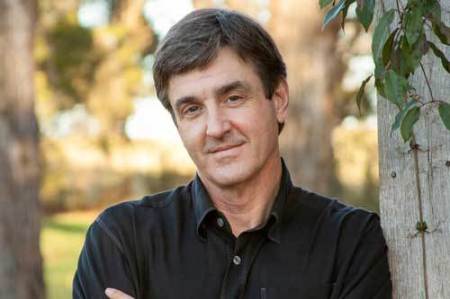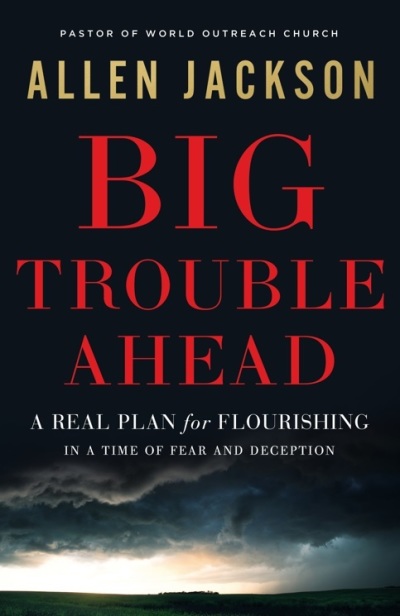Pastor Allen Jackson talks trouble ahead for the Church, Christian nationalism and public education

In the spring of 2020, World Outreach Church Pastor Allen Jackson found himself having to close his Nashville, Tennessee-based megachurch due to the coronavirus pandemic and subsequent lockdowns.
His reflections on that experience and what he learned are part of the new book, Big Trouble Ahead: A Real Plan for Flourishing in a Time of Fear and Deception.
“Now when I have the privilege of being with God’s people, I understand the tremendous honor it is. I will never take it for granted again,” wrote Jackson.
"COVID-19 was a tremor, a foreshock of the challenges ahead," he added. "I pray we are learning lessons to enable us to respond with faith, boldness, and courage."
These challenges, according to Jackson, included lockdowns that were unfair to churches, debates over public school curricula, antipathy toward police officers, and biases found in major news media.
Jackson stressed this point in an interview with The Christian Post, in which he said that he “realized that we were going through something that was about more than a virus from Wuhan, China.”
His goal with Big Trouble Ahead was to “help God's people be prepared to respond to” the challenges to churches in the United States “with something other than just fear and anxiety.”
In a Q&A with CP, Jackson shared what the COVID-19 pandemic revealed to Americans and what Christians need to be on the lookout for that he details in BigTrouble Ahead.

CP: I got the sense from your book that the COVID-19 pandemic simply accelerated a lot of preexisting spiritual and social problems you described. Do you believe this to be the case?
Jackson: I think it would be accurate to say that the pandemic accelerated or maybe even unmasked it, because I think the roots to the things that we're watching now have been in place for quite a period of time.
It’s almost as if we were awakened.
When you're asleep, you're uninvolved, unconcerned, and when you're awake you can be engaged in something. And I think we were just unconcerned and uninvolved in a lot of these things that were happening.
Our schools didn't just become woke. Our college campuses didn't become closed to free speech. That didn't all happen in the spring of 2020. The CDC didn't become unreliable in a week. I think all of those things had been taking place, we just weren't awake to them.
And I think what the pandemic did was awaken us to some circumstances. So, I think in that sense, it was a gift from the Lord.
CP: In Chapter 5, you wrote: "Judeo-Christian values based on the Ten Commandments have provided that framework in the United States for over two hundred years, and that is what separates us from many cultures of the world." How do you respond to those who might view such a comment as evidence of Christian nationalism?
Jackson: Well, I think we have to define Christian nationalism.
If you mean by that, as a Christian do I have a love of country where I reside and a sense of patriotism, yes. If you define Christian nationalism as someone who imagines a superiority because of their faith and a diminishment of every other human being in the culture, then I would reject it.
I don't think love of country gives you permission to whitewash immorality or injustices among us.
And I think it’s being used as a bludgeon to try and intimidate Christians not to be affirming of our nation. It's more popular and more chic these days to be angry at our history and angry at our heritage than it is to celebrate it.
And I think that attitude reflects one of two things: a willful desire to diminish our nation or a real ignorance of the global community. Because we are uniquely blessed, we have more freedom and liberty and abundance than almost any place on the planet, and I believe that it's not difficult to recognize the correlation between that and our biblical worldview. It gives dignity to every citizen; it isn't based upon our gender, our ethnicity or our nationally. We are a nation that is a melting pot.
What binds us together is a set of values that goes all the way back to [Alexi]de Tocqueville. That's not some Evangelical minister who is a firebrand pounding a pulpit. That was an observation by an outsider. And that has stood us in good stead, provided the underpinnings of our legal system of our notions of free speech and of individual rights.
The framers of our founding documents recognized a Creator God — that individuals were endowed by a Creator with certain rights, they're not given to us by a government. All of those things emerge from a biblical worldview, and I believe it’s an appropriate response to God and our culture to recognize we've been beneficiaries of those things in this nation.
CP: In Chapter 7 you warned against the dangers of socialism, writing: "The only money the government has to spend is what it takes from someone else and redistributes. Every time we take those unearned resources, we forfeit some independence." When do you believe the government should step in to provide aid to those in need?
Jackson: I would make a distinction between helping those in need and having an intentional plan to redistribute wealth. I think entitlement is destructive, and I think responsibility for ourselves is a much more biblical view. Now, there are times we all need help. The Bible teaches us to have compassion for the least of these among us. And that's reiterated through the Hebrew prophets and the teachings of Jesus and the Epistles of the New Testament.
But I think we have taken that and extrapolated it into a place where we have made a god out of the government. And we trust the government to secure our future and provide for our children's education and to provide for our healthcare.
God's intent is that He be the One that we trust.
Paul talked about our responsibilities to widows and orphans. He gave us a list of character attributes that were necessary for a woman to be included on the widow's list, and it’s a pretty intimidating list. It was not a list I would even want to implement publicly in the congregation I serve.
I think we have taken those biblical notions of compassion and we have interpreted them to empower a government for whom we give over a great deal of our autonomy and certainly our spiritual freedoms.
CP: In multiple places in the book, you talked about how public schools and even some private schools have become "indoctrination systems." In response to this, do you believe that Christian parents should take their children out of these schools to another alternative like private schools or homeschooling, or do you believe parents should instead influence school boards and curricula through advocacy?
Jackson: I am a product of the public schools, so I am always an unrelenting advocate for public schools. But I think parents have to stay aware of and engaged in what's being taught in our public schools. And I reject the notion that our faith has no place in the public academic system.
A biblical worldview doesn't necessarily exclude the introduction or the discussion of other worldviews. It can have a tolerant component to it.
In recent decades, if there was a biblical worldview expressed, and someone objected, we were told we should withdraw from the arena, that it should be absent, that biblical worldview.
And yet, today we find ourselves both in the public schools or the corporate boardrooms and in so many other places where there is a worldview very aggressively being put forward and if we raise our hands and object that it conflicts with our biblical worldview, we're told to be silent or we are canceled.
At this point, I am a bit embarrassed that I wasn't more intensive and more aware of what was happening. Because I knew what was happening, I experienced it, particularly at the college and university level, but I just went along with the system in order to earn the degrees I wanted.
So, I think parents have to be involved; I think we have to be advocates. We have a right to be heard in the public square. It doesn't have to be exclusively Christian, but we have a right to the idea of the marketplace of ideas just as certainly as any other worldview does.
CP: What do you hope readers take away from your book?
Jackson: I hope that they would take away with it a sense that there's a response that will bring us to a better future. That when we look through the windows of our homes or our churches, we don't want to be filled with fear or panic or anger.
We don't want to respond aggressively or certainly not violently, but we want to begin to respond assertively with the truth that we believe. We've got to lead with our faith.
And if we do that, I believe we have a very hopeful future.
If we fail to do that, I believe we'll experience the judgment of God. I don't believe that we can continue on the pathway we are on and expect a wonderful outcome, but we are not powerless.
There's a long tradition through Scripture and the history of the Church that when God's people will humble themselves and repent and seek His Face, He brings about redemption.
It’s not about a 51% majority, it’s about the hearts of God's people. So, we are empowered and we have an opportunity, and I pray that we take it.






















